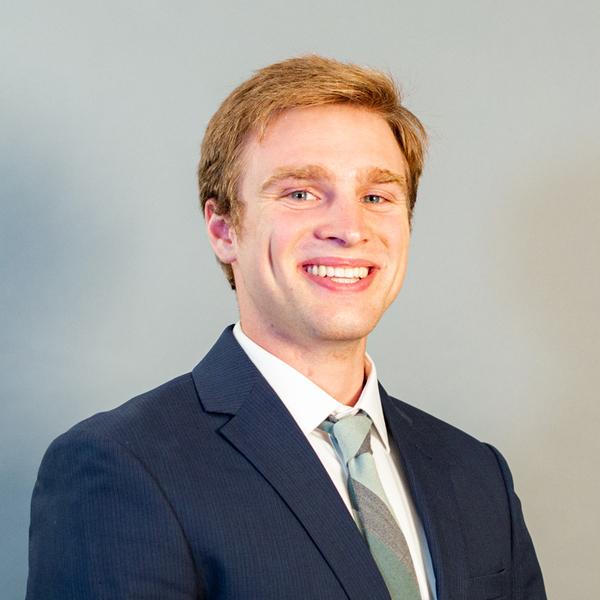
John Burke graduated from Notre Dame in May as one of nine graduating fellows in the Menard Family Tocqueville Fellowship Program. Burke was a Tocqueville Fellow for three semesters, and as he begins a position in Government Affairs with Becket Fund for Religious Liberty in Washington D.C., he is grateful for the ways in which the fellowship helped him to pursue his academic and professional interests.
Religious liberty wasn’t an immediate passion for Burke; rather, it developed naturally over the course of his time at Notre Dame. “[The Tocqueville Program] gave me the resources to hone my interest in religious liberty,” he said.
By combining majors in the Program of Liberal Studies and Economics with a minor in Classical Civilization, Burke was able to explore a variety of intellectual interests: “The whole trajectory of my college career was faith with an education on top of that. Similarly, religious liberty is faith as a baseline but with an intellectual component on top of that, such as how you protect faith using the law,” he said.
During the summer after his sophomore year, Burke interned with Napa Legal Institute (NLI), a start-up religious liberty law firm. The internship provided Burke with a broadened political vocabulary and a new paradigm for understanding current events, as well as giving him first-hand exposure to Supreme Court opinions.
“It was the perfect introduction to religious liberty because it was small, I got to know the people, and they wanted me to get to know what it was like to do law and what was happening in the religious liberty world,” he said.
Through NLI, Burke met a Tocqueville Fellows alumna who encouraged him to apply for the fellowship. “Tocqueville professes to be the religion and public life program, and I thought, ‘That’s exactly what I’m doing!’” Burke said. He became a fellow the following year.
“There are a lot of motivated people in the Tocqueville fellowship, and that wears off on you in a good way. The reason why people go to Notre Dame is to surround themselves with people who are smarter than them, who will drive them to be better, but not in an aggressively competitive way. You get that environment in Tocqueville,” he said.
As a junior, Burke took several Constitutional Studies classes, including a class on Ancient Roman law and Professor Mary Keys’s “Politics and Conscience” class. During the following summer, he interned in the government affairs department at the Becket Fund for Religious Liberty.
“Professor Keys did such a beautiful job of giving us good readings so we could see the history and tradition of conscience, as well as how important it is to society that you have a functional conscience. It was a great introduction into my work with Becket because I knew what conscience was, so then I could learn how it worked in American law.”
At Becket, Burke was able to deepen his interest in religious liberty and learn more about the everyday elements of practicing law through a robust educational component to the internship, which included lectures and reading materials designed to enrich the summer experience.
“Every step was deeper into this specific field of law, what religious liberty is, and what it means for the United States,” Burke said.
Back on campus for his senior year, Burke received funding from the Center for Citizenship and Constitutional Government (CCCG) to attend the Wheatley Student Conference on Religion in the Public Sphere (SCRIPS), held in February 2022.
At the conference, Burke and a group of students from various universities created a proposal for a new non-profit dedicated to improving vote-by-mail on Native reservations. Examining the relationship between religious leadership and civil society on reservations, the group hoped to increase civic participation through the installation of communal mailboxes at preexisting churches. The proposal, titled “Mobilizing Civil Societies on Native Reservations,” won $3000 from SCRIPS to be used for the actualization of the project.
Burke was particularly grateful for the opportunities that the CCCG provided to Tocqueville fellows, from a seminar with Justice Clarence Thomas to colloquia on natural law jurisprudence and conferences like SCRIPS.
“The Center does such an unbelievable job providing opportunities for us to get to know people who are well respected in their fields,” he said.
“Tocqueville taught me how to think through political issues at a higher level. It taught me how to listen to disagreement, process both sides of an argument, and reach my own conclusions—not ideologically, but still in a principled manner. I hope to carry this skill with me the rest of my life,” Burke said.